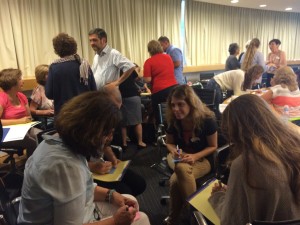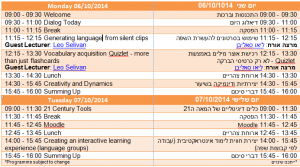Any DOS knows that the quality of their school/programme is dependent on their teachers knowledge, skills, enthusiasm, passion and ability to connect to their students. For a school to thrive and grow it needs to respond to market needs, whilst ensuring that its teachers are provided with professional development opportunities that enable them to stay up to date, develop new skills and most importantly of all, learn from and share with their colleagues.
One of the first goals I set myself when I started working at the Open University eight months ago was to revamp the professional development programme offered to teachers. With more than 130 teachers of 10 languages, and around 40 teachers active in the branches, in- company courses and various tenders at any given time, there is no such thing as one size fits all. Successful professional development must be relevant to the teachers’ needs and not imposed from above.
Challenge number 1: How do we create a programme of professional development which meets the needs of the Arabic, Chinese, Italian, French, Japanese, Hebrew, Russian, German, Spanish, Dutch and English teachers (who make up more than 50% of the teachers), when we the pedagogical team don’t even speak most of those languages?
After revamping the observation and teacher feedback procedures and templates, and having observed many classes myself, I was much more aware of what our strengths as a school were, and where we needed to improve. With my new insights I decided to focus on refreshing our teachers’ knowledge of the communicative language approach and how it is implemented in our school, and the integration of simple digital tools into all courses.
Challenge number 2: How do we get our teachers to attend the first workshop to be given in Dialog under my leadership? Many of my colleagues told me that I should expect about 20 teachers to attend. Our teachers live all over the country, and many teach at the given time, and “to be honest as they aren’t paid for professional development they probably won’t come”, one colleague clarified for me.
Hmm. That is a tricky one! However, I thought to myself, I do lots of things for myself that I am not paid for, and as a teacher I also love to learn and am happy to give up my own time if I feel that I am going to get something of benefit out of the experience. I imagined that this is probably true of most teachers. With this in mind it was clear that the first workshop needed to have an engaging title and must be relevant and fun. And so on the 2 May 2014, “Integrating digital tools into the language classroom”, which focused on using Smartphones, was attended by 35 Dialog teachers. There was a lot of energy in the classroom and there was a lot of professional conversation: “Professional Development takes place through professional conversation.” Garton and Richards (2011)
Not wanting to lose momentum I decided that the next workshop would be two days in October, just before the start of the new school year. In June we sent out a save the date, digital flier. In July and August we worked on the content. It was clear to me that we had to build a programme that would review the schools pedagogical approach and expectations and would set clear teaching and PD guidelines. There needed to be lots of group work activities, both in mixed language groups and specific language groups. There needed to be time to work on an activity or lesson plan with colleagues and time in the computer room learning and experiencing the digital tools to be integrated into lessons. Most importantly of all there needed to be down time, talk time, as this is when most learning often happens. I am supported by three highly experienced pedagogical managers, and together we were going to provide the professional training workshops. However, I felt that a guest speaker was going to make our programme so much more attractive to our diverse teaching team. Who could provide training to so many language teachers? Leo Selivan (Leoxicon) was the obvious answer.
In my next blog post, “The Red Rabbit generates the Tower of Babel”, I’ll share the highlight of the Dialog Language School October Professional Development workshop.


Wow, what a challenge. And great to hear that Leo was the answer to helping to solve it. 🙂
Thanks Marjorie for your comment. It is challenging, but that is certainly what makes the job interesting, and great for my own professional development too. Stay tuned for how Leo’s workshop went.